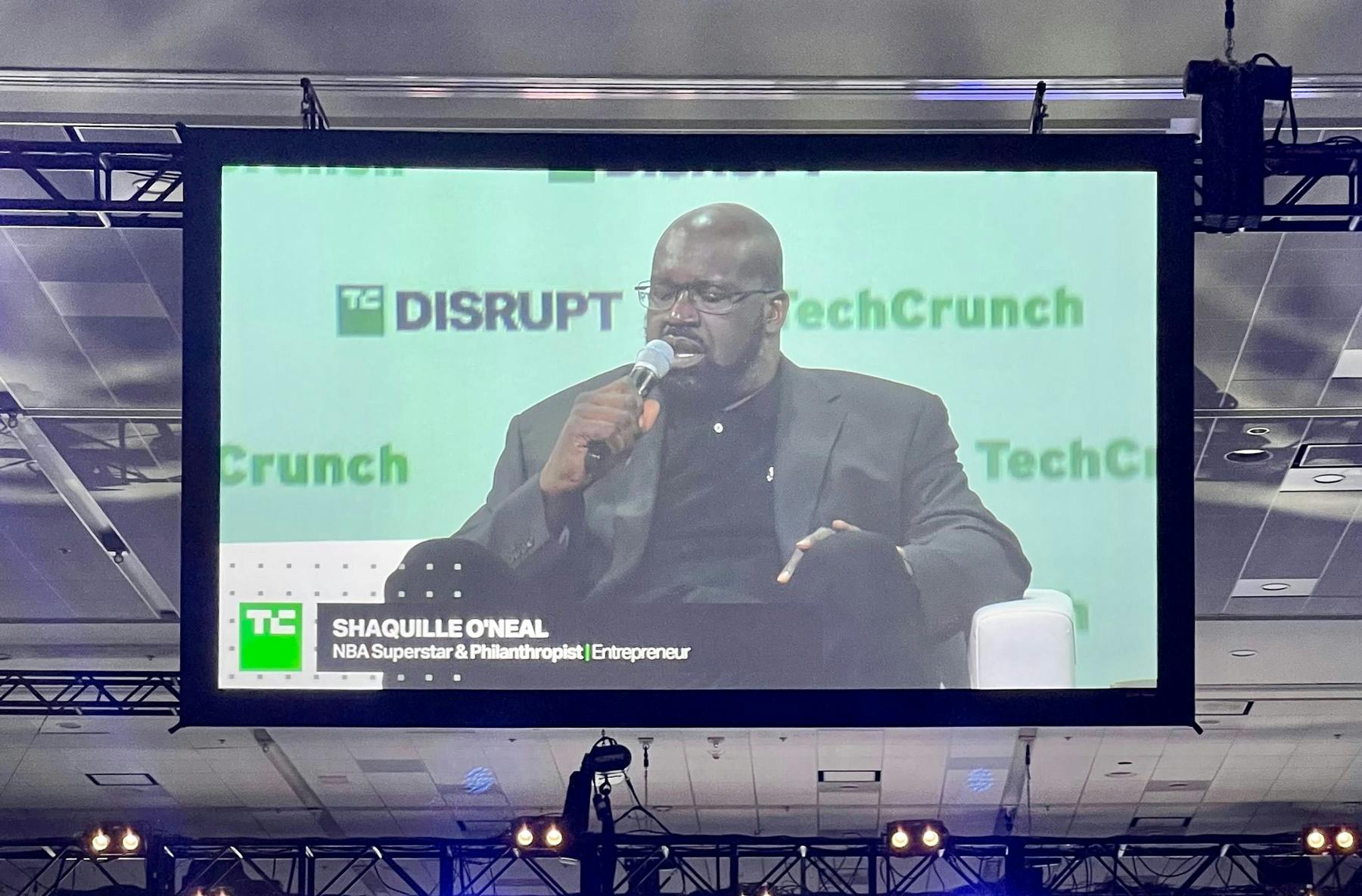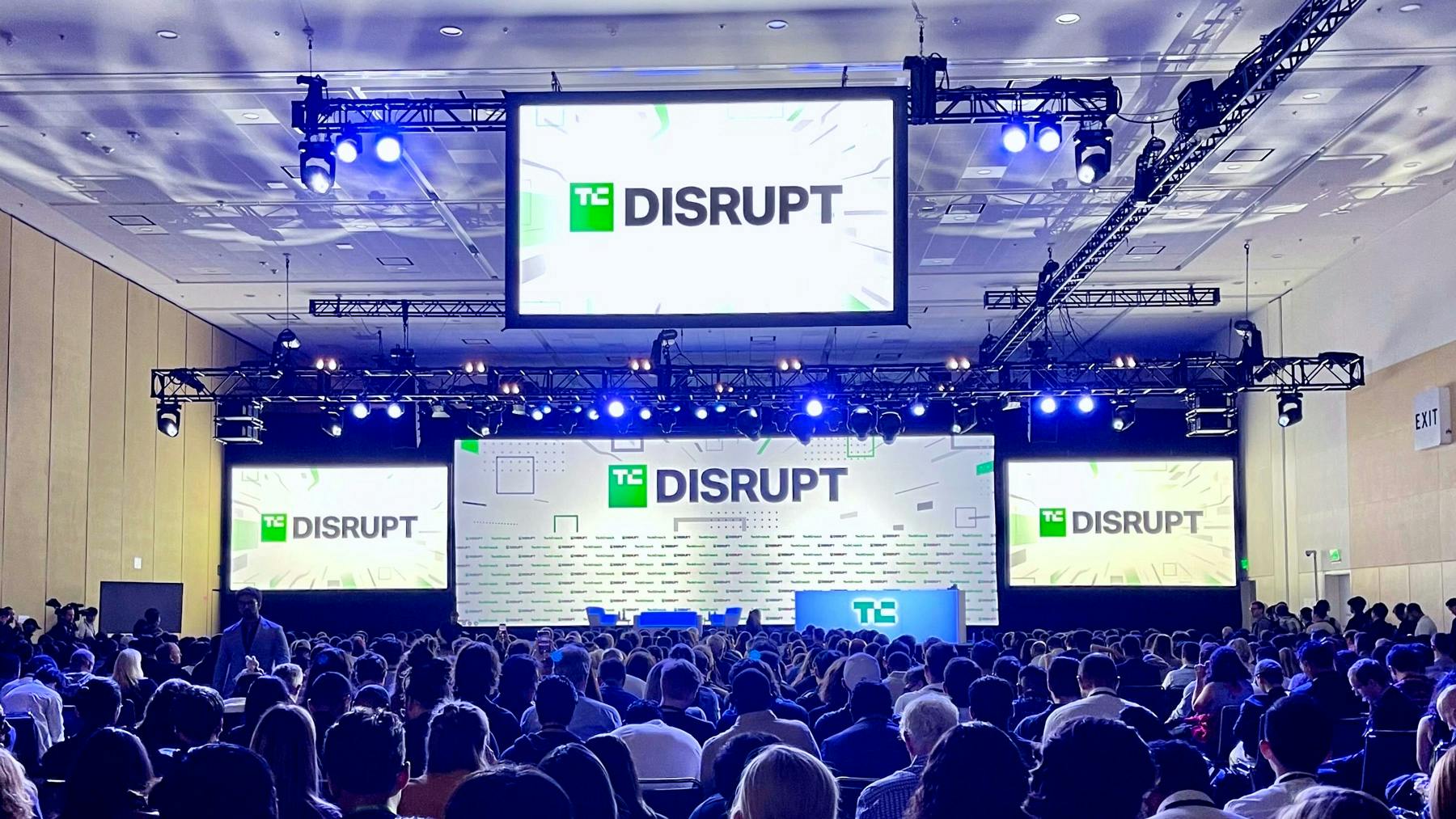Startup Battlefield
More than 12,000 people attended TechCrunch Disrupt 2023 in San Francisco. Among the exhibitors were 200 startups competing in the Startup Battlefield, chosen from over 3,200 applicants to be at the conference. 20 of these exhibitors got to pitch to a panel of judges for the opportunity to win $100,000.
But the prize money—giant check included—is just the icing on the cake. Even making it to the finals of Startup Battlefield can open doors. One of last year’s finalists, AppMap, has since raised almost $10M in funding according to company founder Elizabeth Lawler. She emphasized, that “the positive impact of Battlefield for startups is undeniable”.
Winners
The main judging criteria on the Startup Battlefield is potential for impact—either social or financial. And, indeed, this year’s winner, BioticsAI, aims to improve the quality, accuracy and completeness of second-trimester ultrasound screenings using its AI technology.
The platform supports healthcare staff as they perform ultrasound scans, analyzing uploaded images for indications of malformations or other pre-natal issues that may be missed by a tired, stressed, or inattentive human at the controls. The company has started with pre-natal care, but has designs on adjacent fields like gynecology, urology and more: Aiming to become the AI diagnostics platform for reproductive health.
Congratulations to BioticsAI! We look forward to hearing great things!
Runners up
Another startup of note (among many others) on the Startup Battlefield was Electrified Thermal Solutions, which aims to electrify heavy industry using bricks. But not just any bricks: Co-founders Daniel Stack and Joey Kabel have developed an electric brick that can be turned into a thermal battery so hot, it removes the need for combustion altogether.
Switching to green electricity gets expensive when you need to maintain temperatures above 1,000 degrees Celsius, but the Joule Hives provided by Electrified Thermal Solutions can match those temperatures (easily maintaining temperatures as high as 1,800 degrees) without the costs of hydrogen-generated electricity or the unreliability of wind or solar. A Joule Hive can hold heat for hours or days, with up to 95% of the energy put in being recovered as heat.
For now, the startup is shooting for cement and concrete, waste incineration and basic chemicals, but they want to see their technology implemented across ever more industrial sectors—wherever constant, high temperatures are required.
Paper batteries
Meanwhile in Singapore, a startup named Flint has created a paper battery that forgoes the rarer, expensive and environmentally unfriendly lithium, cobalt and nickel in favor of zinc, manganese and cellulose—making batteries much more sustainable in the long term. These paper batteries are even compostable.
Flint co-founder Carlo Charles claims that although the chemical makeup of the battery is different, the same manufacturing process can be used for their paper batteries. So, manufacturers of lithium batteries would be able to simply swap materials to begin making them, instead of requiring expensive new machinery and processes.
The technology is still in its early days; Flint has a working prototype and is looking to explore the possibilities for wearable tech, electric vehicles—and even electric aircraft. Nevertheless, we will be keeping an eye on this one!
Artificial intelligence
A key part of the Startup Battlefield 2023 winner was its AI platform, and artificial intelligence was definitely (and unsurprisingly) the biggest topic at the TechCrunch Disrupt 2023 conference.
As the link between AI and software engineering becomes increasingly significant, it raises important questions about the role of developers in this evolving landscape. Thomas Dohmke, CEO of GitHub, articulated this connection during a fireside chat at the conference. Dohmke emphasized, “AI and software development are now inextricably linked for the rest of our lives”. He proceeded: “The demand for software developers will continue to outweigh the supply.” The amount of software in 10 years is going to exponentially grow with an ever-increasing number of lines of code to manage, and an ever-growing number of ideas for new software or features, Dohmke predicts and adds:
Gold rush
There were also several talks and roundtable sessions on subjects such as the ethics of AI, how to use it for social good, how to navigate the ‘gold rush,’ its merits for different use cases, and—on the show floor—debates whether “AI” is coming to mean a data-driven product with a nice-looking frontend slapped on.
Sports legend and venture capital investor Shaquille O’Neal appeared with the founder of Edsoma. They discussed using AI to help underprivileged children across the US improve their reading skills. In principle, the more users the educational platform has, the more data they can accumulate, analyze, and use to improve the experience for other users.

Robotaxis and fleet learning
In another fireside chat with Cruise’s president Kyle Vogt, we learned that his company has now crossed 5 million driverless miles. The founder believes autonomous vehicles (AV) are here to stay, even if there’s some resistance to them at the moment. He said the first million AV miles in a new city sees a 75% reduction in the number of accidents that cause injury, so “if we’re serious about safety in our cities, we should roll out the red carpet for AVs”.
Vogt emphasized the power of fleet learning—every car in the company’s fleet is collecting data that makes every other car more efficient. And as they develop hardware suited to different climates and add more vehicles to the fleet, the data set grows exponentially.
Even so, according to Vogt, we shouldn’t expect perfection from AVs (for now at least) because the system is flawed. But short of perfection, if AVs reduce the likelihood of accidents by 100x, Vogt said we have to take a good look at why we’re still allowing human-driven vehicles on the road.
Finally, he discussed getting robotaxis into the hands of more people, mentioning new ownership models such as owner/sharer or group ownership (a topic we discuss in our article, "How Apple could disrupt the automotive industry within a decade"). More people lead to lower cost, which decreases friction for AVs and their widespread adoption. In the end, Vogt assured that “robotaxi ownership models are inevitable”.
Stay tuned for more conference action—and read our highlights from Slush 2023 in Helsinki, Finland!
